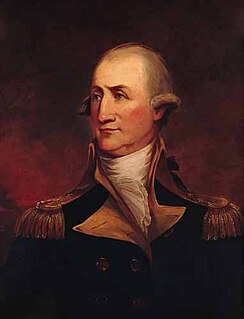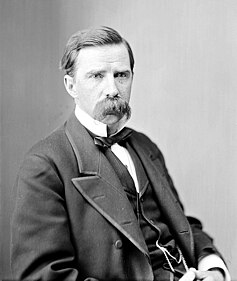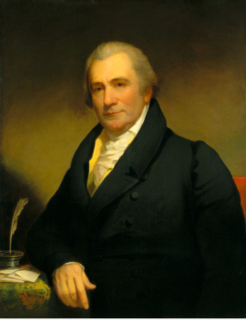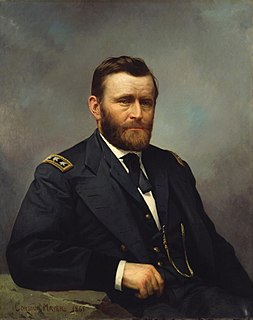Related Research Articles

Ulysses S. Grant was an American military officer and politician who served as the 18th president of the United States from 1869 to 1877. As president, Grant was an effective civil rights executive who created the Justice Department and worked with the Radical Republicans to protect African Americans during Reconstruction. Previously, as Commanding General, he led the Union Army to victory in the American Civil War in 1865 and thereafter briefly served as Secretary of War.

The Battle of the Crater was a battle of the American Civil War, part of the siege of Petersburg. It took place on Saturday, July 30, 1864, between the Confederate Army of Northern Virginia, commanded by General Robert E. Lee, and the Union Army of the Potomac, commanded by Major General George G. Meade.

The Richmond–Petersburg campaign was a series of battles around Petersburg, Virginia, fought from June 9, 1864, to March 25, 1865, during the American Civil War. Although it is more popularly known as the Siege of Petersburg, it was not a classic military siege, in which a city is usually surrounded and all supply lines are cut off, nor was it strictly limited to actions against Petersburg. The campaign consisted of nine months of trench warfare in which Union forces commanded by Lt. Gen. Ulysses S. Grant assaulted Petersburg unsuccessfully and then constructed trench lines that eventually extended over 30 miles (48 km) from the eastern outskirts of Richmond, Virginia, to around the eastern and southern outskirts of Petersburg. Petersburg was crucial to the supply of Confederate Gen. Robert E. Lee's army and the Confederate capital of Richmond. Numerous raids were conducted and battles fought in attempts to cut off the Richmond and Petersburg Railroad. Many of these battles caused the lengthening of the trench lines.

Frederick Augustus Conrad Muhlenberg was an American minister and politician who was the first Speaker of the United States House of Representatives and the first Dean of the United States House of Representatives. A member of the Federalist party, he was delegate to the Pennsylvania state constitutional convention and a member of the U.S. House of Representatives from Pennsylvania and a Lutheran pastor by profession, Muhlenberg was born in Trappe, Pennsylvania. His home, known as The Speaker's House, is now a museum and is currently undergoing restoration to restore its appearance during Muhlenberg's occupancy.

John Peter Gabriel Muhlenberg was an American clergyman, Continental Army soldier during the American Revolutionary War, and political figure in the newly independent United States. A Lutheran minister, he served in the United States House of Representatives and United States Senate from Pennsylvania.

John Frederick Hartranft was the United States military officer who read the death warrant to the individuals who were executed on July 7, 1865 for conspiring to assassinate American President Abraham Lincoln. Previously having achieved the rank of major general of the Union Army during the American Civil War, he had also been awarded the U.S. Medal of Honor for his actions in the First Battle of Bull Run.

Robert Nelson Cornelius Nix Sr. was an American politician who served in the United States House of Representatives from 1958 until 1979. He was the first African American to represent Pennsylvania in the House of Representatives. The Robert N. C. Nix Federal Building in Philadelphia, Pennsylvania is named in his honor.

Henry Augustus Philip Muhlenberg was an American political leader and diplomat. He was a member of the Muhlenberg family political dynasty.

Isaac Ellmaker Hiester was an American political leader of the nineteenth Century. He was a member of the Hiester Family political dynasty. He was the son of William Hiester and cousin of Hiester Clymer.

Edward Selig Salomon was a German Jew who immigrated to the United States and served as a lieutenant colonel in Union in the American Civil War. After nomination for appointment to the grade of brevet brigadier general of volunteers to rank from March 13, 1865, by President Andrew Johnson on January 13, 1866, the United States Senate confirmed the appointment on March 12, 1866. Salomon later became governor of Washington Territory and a California legislator.

The Battle of Chaffin's Farm and New Market Heights, also known as Laurel Hill and combats at Forts Harrison, Johnson, and Gilmer, was fought in Virginia on September 29–30, 1864, as part of the siege of Petersburg in the American Civil War.

William Wallace Atterbury was a brigadier general in the United States Army during World War I, who began his career with the Pennsylvania Railroad (PRR) in 1886 and rose through the ranks to become its tenth president (1925–1935). As director-general of transportation in France during the war, the New Albany, Indiana, native and Yale University graduate was instrumental in reorganizing railroad traffic for more efficient transportation of troops and supplies for the American Expeditionary Forces. He was also known as "The Railroad General". Under his leadership after the war, the Pennsylvania Railroad undertook a $250 million project to electrify major portions of its main line that ran between New York City and Washington, D.C. He also assisted in development of the company's first M1-class steam locomotive.

James Donald Cameron was an American politician from Pennsylvania who served as Secretary of War under President Ulysses S. Grant and in the United States Senate for nearly twenty years. In May, 1876 Cameron was part of a Cabinet realignment by President Grant, having been appointed after a brief tenure by Secretary Alphonso Taft, whom Grant appointed U.S. Attorney General. Former Secretary William W. Belknap had resigned from office, was impeached by the House for taking kickbacks from the Fort Sill tradership, put on trial in the Senate and acquitted. Secretary Cameron was one of two father-son combinations that served as Secretary of War. Cameron's father, Simon Cameron, served in that office under President Abraham Lincoln. The other father-son combination was Secretary Alphonso Taft and his son Secretary William Howard Taft. During Cameron's tenure the U.S. military was challenged by the Great Sioux War and by the threat of a second Southern secession after the controversial election of President Rutherford B. Hayes that ended Reconstruction. Cameron proved to be an energetic administrator and his appointment as Secretary of War launched his lengthy political career in the Senate.

Gotthilf Heinrich Ernst Muhlenberg was an American clergyman and botanist.

Robert Coleman was an Irish-American industrialist who rose from a holding clerkship at a prothonotary's office in Philadelphia to bookkeeper at Cornwall Iron Furnace to becoming Pennsylvania's first millionaire.
Edward Duchman Muhlenberg was an American civil engineer in the railroad industry and an officer in the Union Army during the American Civil War. He commanded an artillery brigade at the Battle of Gettysburg while only a lieutenant. He played an important role in the defense of Culp's Hill against attacking Confederates.

The Medal of Honor (MOH) is the United States government's highest and most prestigious military decoration that may be awarded to recognize American soldiers, sailors, Marines, airmen, guardians, and coast guardsmen who have distinguished themselves by acts of valor. The medal is normally awarded by the President of the United States, but as it is presented "in the name of the United States Congress", it is often referred to (erroneously) as the "Congressional Medal of Honor".

Ulysses S. Grant was the 18th president of the United States (1869–1877) following his success as military commander in the American Civil War. Under Grant, the Union Army defeated the Confederate military and secession, the war ending with the surrender of Robert E. Lee's army at Appomattox Court House. As president, Grant led the Radical Republicans in their effort to eliminate vestiges of Confederate nationalism and slavery, protect African American citizenship, and pursued Reconstruction in the former Confederate states. In foreign policy, Grant sought to increase American trade and influence, while remaining at peace with the world. Although his Republican Party split in 1872 as reformers denounced him, Grant was easily reelected. During his second term the country's economy was devastated by the Panic of 1873, while investigations exposed corruption scandals in the administration. Although still below average, his reputation among scholars has significantly improved in recent years because of greater appreciation for his commitment to civil rights, moral courage in his prosecution of the Ku Klux Klan, and enforcement of voting rights.

Hundreds of historians and biographers have written biographies and historical accounts about the life of Ulysses S. Grant and his performance in military and presidential affairs. Very few presidential reputations have shifted as dramatically as Grant's.
References
- ↑ "Marie H. Bonekemper". The Morning Call. 10 May 2005. Retrieved 26 April 2015.
- ↑ "Edward H. Bonekemper III". Lancaster Online. 17 Dec 2017. Retrieved 10 Jan 2017.
- 1 2 "Reunion 2009: It's a Wrap!". The Talents Entrusted to our Care. 22 June 2009. Retrieved 23 April 2015.
- 1 2 3 4 5 6 "Edward Bonekemper". Conservative Book Club. Retrieved 22 April 2015.
- 1 2 3 4 5 6 7 "Edward H. Bonekmeper is a CWN Book Review Editor". Civil War News. Archived from the original on 4 March 2016. Retrieved 23 April 2015.
- 1 2 3 "Six Turning Points of the Civil War" (PDF). Civil War Round Table of Eastern Pennsylvania. Retrieved 23 April 2015.[ permanent dead link ]
- 1 2 "Lincoln and Grant to be discussed at upcoming Civil War Round Table Meeting". Port City Daily. 25 December 2014. Retrieved 23 April 2015.
- 1 2 Blosser, Shannon (27 August 2004). "General Grant defended in Raleigh". Carolina Journal Online. Retrieved 22 April 2015.
- ↑ "Edward H. Bonekemper III" Lancaster Online.